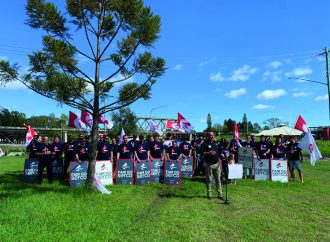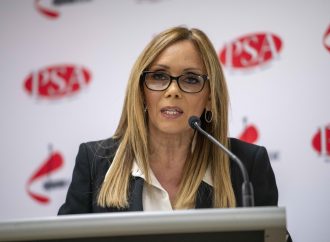People are beginning to realise government is what makes for a civil society.
Question: What do buses, electricity, motorways, prisons, hospitals, public housing and disability services have in common? Its not a children’s riddle, but it is a sick joke. The answer: they all have been privatised under the NSW Liberal-National Coalition Government over the past 12 years.
Privatisation has become one of the key policy debates in this year’s NSW state election.
Most of our members in many agencies have at least felt the threat of it, with the consequent job insecurity and erosion of working conditions uncomfortably breathing down their neck.
But perhaps nowhere has its absurdity been more exposed over the past 12 months than in the two privately operated prisons covered by your union – Clarence Correctional Centre at Grafton and Parklea Correctional Centre in northwest Sydney.
The companies that operate these gaols on behalf of the NSW Coalition Government – British multinational Serco and MTC respectively – have a business model where crime does pay … for their shareholders.
The idea that a corporation can make money from prisoners is repulsive to most, but there’s more. What is apparent in the PSA/CPSU NSW’s dealings with these companies is that they actually make their buck out of Prison Officers. Every shift that is short-staffed, and wages don’t have to be paid, is profit. Every post of every shift of every day where the Officers are paid less than what has been quoted to the government, is profit.
It’s vulture capitalism, where a business model dictates you have to cut so many corners that eventually you eat yourself.
What our members fear however is that the relentless scouring for short cuts for gain is compromising their safety. And it is no-one’s job to risk their well being in a dangerous work environment to boost a bottom line.
At Budget Estimates in October 2022, Minister for Corrections Dr Geoff Lee was asked why some gaols continue to remain with the private sector.
“They bring a sense of new ideas and innovation,” he replied.
For our members, the only innovation they are seeing by their corporate employers is wage cutting.
This is why over the past 12 months our members at both centres have taken industrial action. They know that low wages do not only hurt their family budget, but also make it difficult for the two companies to attract and retain staff, which means safety is compromised even further.
It is also an obvious outcome of the penny-pinching ethos they operate under.
The year 8 commerce theory that competition produces better outcomes doesn’t apply here – the “market” of possible operators is so small that this is a myth.
They are also less accountable than the public sector, hiding behind commercial-in-confidence to avoid their affairs being exposed to the taxpayer who funds them.
The arguments just don’t stack up.
Premier Perrottet famously described privatisation as the “golden key”. For our members, particularly in privately operated prisons, it is more like a broken lock.



















Leave a Comment
Your email address will not be published. Required fields are marked with *